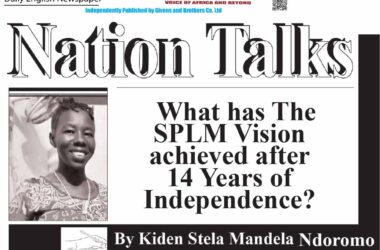By William Madouk
Vice President for the Economic Cluster, Dr. James Wani Igga, has called for severe penalties for individuals involved in the misappropriation of public funds.
South Sudan’s public finance management system has long been plagued by indiscipline resulting in the misappropriation and mismanagement of public funds.
Dr. Igga stressed that without effective enforcement of laws, public respect for the laws will diminish. “
He also pointed to fiscal malpractices occurring during budget allocations and transfers, urging the need for improved accountability measures.
“We need to dig them out and punish people properly. You see, there is a law and order in this world – only and only if there are punishments and penalties imposed on the conflicts,” VP noted.
“Other than that, to hell. Nobody really cares about your laws because the laws, don’t bite. Penalties must be imposed,” he stated.
Dr. Igga underscored that the continuing source of tension is vertical fiscal gaps where spending exceeds revenues needed especially when there is no control.
“Expenditure needs are always higher or it can even go to the sky if there are no controls and especially at the lower levels of the government,” he said.
VP claimed that fiscal conflicts in federal countries – for instance, South Sudan usually arise due to competing interests in the division of fiscal resources, knowing that natural resources are in few regions.
According to him, vertical fiscal gaps and revenue autonomy of the sub-national orders of the government remain as areas of concern in all federal countries not just South Sudan.
“If we centralize too much powers of taxation, instead of giving the states also rights, then you have extra reward problem because you cannot satisfy their needs.
“This leads of course to undue central control oversight of sub-national policies, and can even undermine accountability.
Igga emphasized that lack of clarity and coordination of shared roles and responsibilities also led to conflicts.
“The ministry of finance and state government must adopt and follow acceptable laws. The division of these fiscal files must be fair and transparent,” he said.
The fourth high-level forum summit to shed light on fiscal devolution and revenue management in the country commenced on Tuesday.
The three-day summit that opened yesterday, comes amid clamor by the Council of States as oil-producing states and communities cry foul of lack of the implementation of 5 percent oil share.
The initiative under the permanent constitution-making process is to discuss aspects of federalism such as fiscal federalism and wealth sharing that cascade down to revenue management as part of wealth.
The event was organized by the Council of States in partnership with UNMISS and UNDP.
It draws together stakeholders like the National Ministries of Petroleum, Federal Affairs and Finance, policymakers, members of civil society and lawmakers, academia, and the National Constitutional Review Commission.
Others include the Communities from the Oil Producing areas, the national and state officials.




